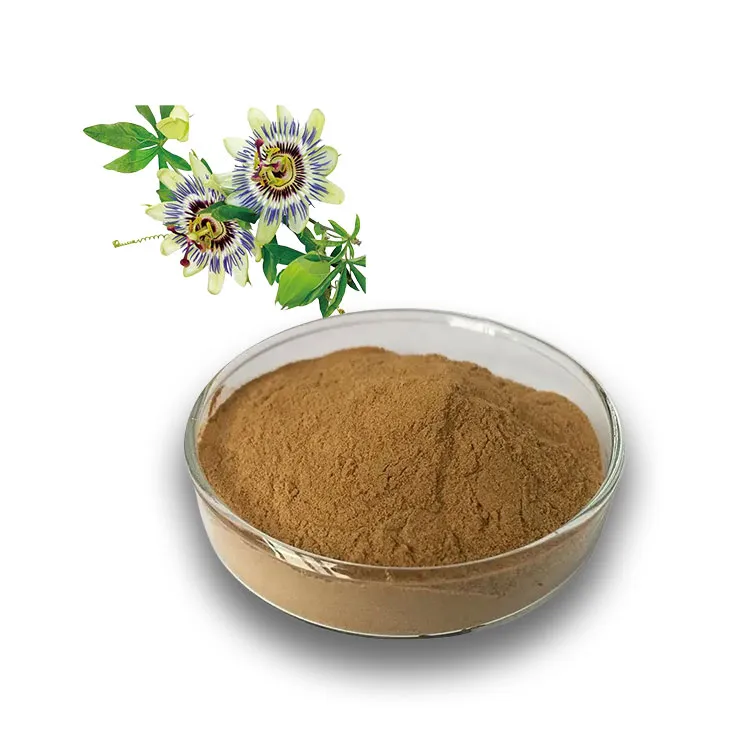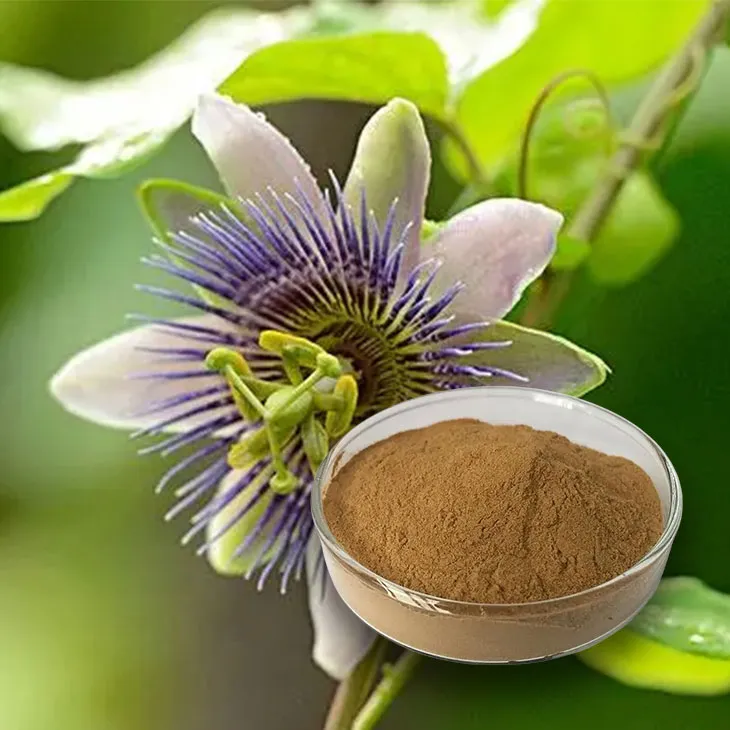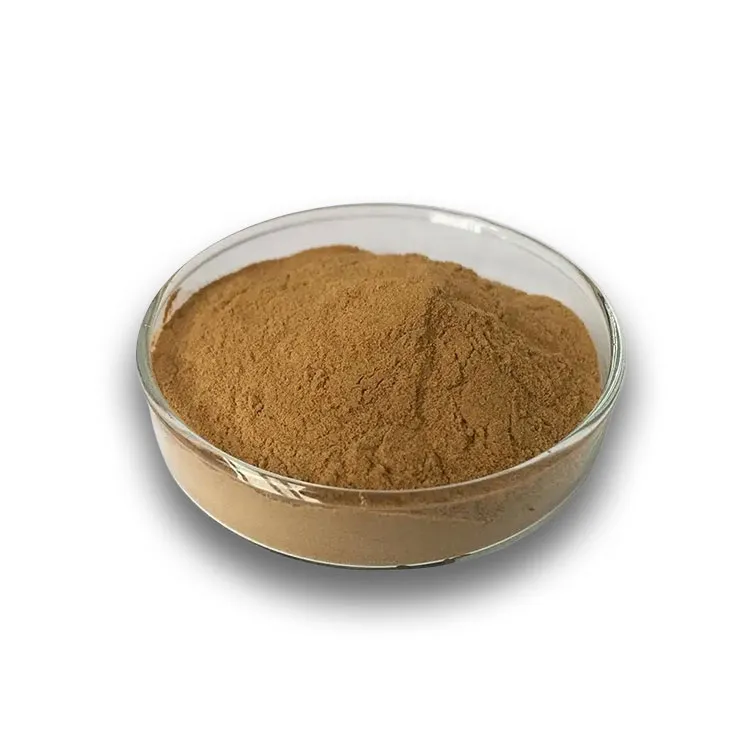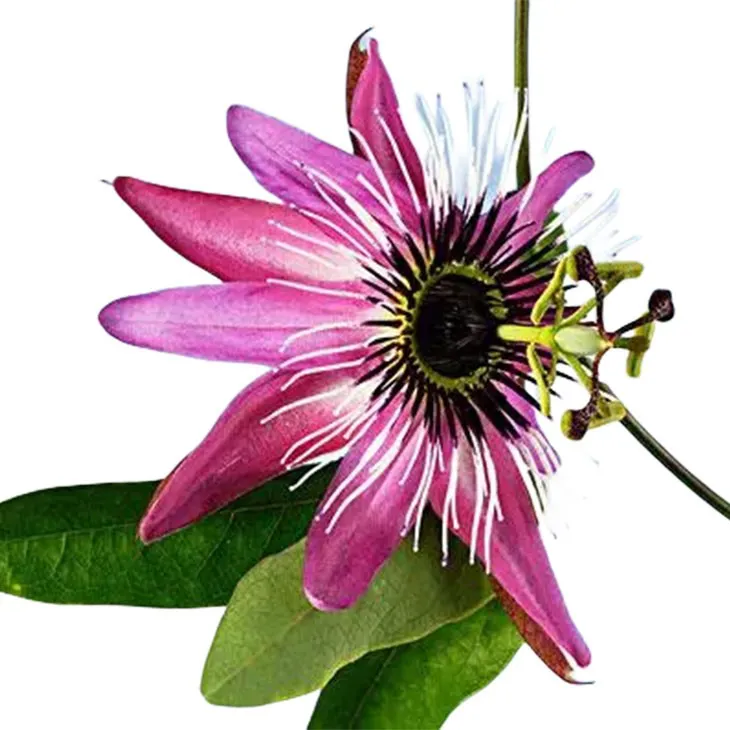- 0086-571-85302990
- sales@greenskybio.com
Components of fertilizer and feed from passionflower extract.
2024-11-27

1. Introduction
The passionflower, specifically the West Passionflower, has been garnering increasing attention in recent years. Its extract has found applications in two important areas: fertilizers and feed. This is due to its unique properties that can offer numerous benefits to plants and animals alike.

2. Passionflower Extract in Fertilizers
2.1. Natural and Sustainable
In the realm of fertilizers, the West Passionflower Extract presents itself as a natural and sustainable option. With the growing emphasis on environmental conservation and sustainable agricultural practices, the use of natural extracts in fertilizers is becoming more appealing. Traditional chemical fertilizers, while effective in providing nutrients to plants, can have negative impacts on the environment over time, such as soil degradation and water pollution. The Passionflower Extract, on the other hand, offers a more eco - friendly alternative.
2.2. Influence on Soil Microbiota
One of the key aspects of how the passionflower extract benefits fertilizers is through its impact on soil microbiota. The soil is a complex ecosystem filled with a myriad of microorganisms, including bacteria, fungi, and protozoa. These microorganisms play crucial roles in nutrient cycling. Compounds present in the passionflower extract can interact with these soil microbes in various ways.
For example, some components of the extract may act as stimulants for beneficial bacteria. These bacteria are involved in processes such as nitrogen fixation, where they convert atmospheric nitrogen into a form that plants can use. By promoting the growth and activity of these nitrogen - fixing bacteria, the passionflower extract can indirectly enhance the nitrogen availability in the soil for plants.
Moreover, the extract can also influence the composition of the soil fungal community. Mycorrhizal fungi, which form symbiotic relationships with plant roots, are important for nutrient uptake, especially phosphorus. The passionflower extract may encourage the growth of these mycorrhizal fungi, thereby improving the plant's ability to access phosphorus and other nutrients.
2.3. Nutrient Cycling and Availability
As a result of its influence on soil microbiota, the passionflower extract has a significant impact on nutrient cycling and availability in the soil. Nutrient cycling is the process by which nutrients are continuously recycled between the soil, plants, and microorganisms. When the extract modifies the activity of soil microbes, it can accelerate or regulate this cycling process.
For instance, the decomposition of organic matter in the soil, which releases nutrients such as carbon, nitrogen, and phosphorus, can be affected by the presence of the passionflower extract. If the extract promotes the growth of certain decomposer organisms, the rate of organic matter decomposition may increase, leading to a more rapid release of nutrients. This, in turn, makes these nutrients more readily available to plants, promoting their growth and development.

3. Passionflower Extract in Feed Components
3.1. A Novel Additive
In the field of animal feed, the West Passionflower extract has the potential to be a novel additive. The demand for high - quality animal feed is constantly increasing as the livestock industry aims to improve animal health, growth performance, and the quality of animal products. Traditional feed additives have their limitations, and the exploration of new natural additives like the passionflower extract is an area of active research.
3.2. Influence on Nutritional Profile
The passionflower extract can significantly influence the nutritional profile of the feed. It may contain certain bioactive compounds that can complement the existing nutrients in the feed. For example, it could be a source of antioxidants, which are important for animal health. Antioxidants help to protect animal cells from oxidative damage caused by free radicals. This is particularly relevant in situations where animals may be exposed to stressors, such as heat stress or disease challenges.
Furthermore, the extract may also contain other beneficial compounds such as vitamins or minerals in trace amounts. These additional nutrients can enhance the overall nutritional value of the feed, ensuring that animals receive a more balanced diet.
3.3. Impact on Animal Health and Growth Performance
The addition of passionflower extract to feed can have a positive impact on animal health and growth performance. One of the notable effects is the improvement of feed conversion ratios. Feed conversion ratio (FCR) is a measure of how efficiently an animal converts feed into body mass. A lower FCR indicates that an animal is using the feed more efficiently, which is economically beneficial for livestock producers.
The passionflower extract may enhance digestion in animals. It could stimulate the secretion of digestive enzymes or improve the gut microbiota of animals. A healthy gut microbiota is essential for proper digestion and absorption of nutrients. By promoting a favorable gut environment, the extract can help animals better utilize the nutrients in the feed, leading to improved growth rates.
Moreover, the use of the extract can also have an impact on the quality of animal products. For example, in poultry, it may result in eggs with better nutritional quality, such as higher levels of certain vitamins or a more favorable fatty acid profile. In livestock such as cattle, it could potentially improve the quality of meat, for instance, by enhancing the marbling or tenderness of the meat.

4. Research and Development
4.1. Current Research Status
Currently, there is ongoing research on the use of passionflower extract in fertilizers and feed. In the case of fertilizers, researchers are focused on identifying the specific compounds in the extract that are responsible for its effects on soil microbiota and nutrient cycling. They are also conducting field trials to determine the optimal application rates of the extract for different types of plants.
For feed applications, studies are being carried out to fully understand the nutritional and physiological effects of the extract on various animals. This includes investigations into how different dosages of the extract affect animal growth, health, and product quality. Scientists are also exploring ways to standardize the extraction process to ensure consistent quality of the extract for use in feed.
4.2. Future Prospects
The future prospects for the use of passionflower extract in fertilizers and feed are promising. As the demand for sustainable agricultural and livestock production practices continues to grow, the natural and beneficial properties of the extract are likely to be further exploited.
In the area of fertilizers, there is potential for the development of new products that combine the passionflower extract with other natural or synthetic fertilizers to achieve even better plant growth results. In the feed industry, the extract could become a more widely used additive as more research validates its positive effects on animal health and product quality.

5. Challenges and Considerations
5.1. Extraction and Standardization
One of the main challenges in using passionflower extract in fertilizers and feed is the extraction process and standardization. The extraction of the active compounds from the passionflower needs to be optimized to ensure high yields and purity. Different extraction methods can result in variations in the composition of the extract, which can affect its performance in fertilizers and feed.
Standardization is also crucial to ensure that the extract has consistent quality. This requires the establishment of quality control measures and standards for the extraction process, as well as for the final product. Without proper standardization, it can be difficult to accurately predict the effects of the extract in different applications.
5.2. Regulatory and Safety Aspects
Another important consideration is the regulatory and safety aspects. In the case of fertilizers, there may be regulations regarding the use of natural extracts to ensure that they do not have any negative impacts on the environment or human health. For feed applications, strict regulatory requirements exist to ensure the safety of animals and the consumers of animal products.
The passionflower extract needs to be thoroughly tested for any potential toxicity or adverse effects on animals. This includes short - term and long - term toxicity studies, as well as investigations into possible interactions with other feed ingredients or medications that animals may be receiving.
6. Conclusion
The West Passionflower extract holds great potential as a component in both fertilizers and feed. Its natural properties make it an attractive option for sustainable agricultural and livestock production. While there are challenges in terms of extraction, standardization, and regulatory compliance, the ongoing research and development in this area are likely to overcome these obstacles in the future.
As more is understood about the specific components of the passionflower extract and their functions in fertilizers and feed, it is expected that its use will become more widespread, contributing to more efficient plant growth, healthier animals, and higher - quality animal products.
FAQ:
What are the main components of passionflower extract used in fertilizers?
The main components in passionflower extract for fertilizers are those that can influence soil microbiota. These components play a role in nutrient cycling, making nutrients more available to plants. However, the specific compounds can vary, and further research is often needed to fully identify and understand all of them.
How does passionflower extract in feed improve animal product quality?
Passionflower extract in feed can improve animal product quality by influencing the nutritional profile of the feed. It may enhance certain aspects of the animals' metabolism related to product formation. For example, it could potentially affect fat deposition or protein synthesis in a way that results in better - quality meat, eggs, or milk. But the exact mechanisms are still being studied.
Is passionflower extract safe for long - term use in feed?
Currently, while passionflower extract shows potential as a feed additive, more research is required to determine its long - term safety. Initial studies suggest that it has beneficial effects, but long - term use could potentially have unforeseen consequences. Factors such as dosage, potential accumulation in the animal's body, and interactions with other feed components need to be thoroughly investigated.
Can passionflower extract replace traditional fertilizers?
At present, passionflower extract cannot fully replace traditional fertilizers. While it offers a natural and sustainable way to enhance plant development, traditional fertilizers are often more concentrated sources of essential nutrients like nitrogen, phosphorus, and potassium. However, passionflower extract can be used as a complementary product to improve soil health and nutrient cycling, potentially reducing the amount of traditional fertilizer needed.
How is passionflower extract processed for use in fertilizers and feed?
The processing of passionflower extract for use in fertilizers and feed typically involves extraction methods to isolate the beneficial components. This may include techniques such as solvent extraction or mechanical pressing, followed by purification steps to remove unwanted substances. The resulting extract is then formulated into fertilizers or feed additives, often with other ingredients to optimize its performance.
Related literature
- The Role of Natural Extracts in Fertilization: A Focus on Passionflower"
- "Passionflower Extract as a Feed Additive: New Insights into Animal Nutrition"
- "Beneficial Components of Passionflower Extract for Soil and Plant Health"
- ▶ Hesperidin
- ▶ citrus bioflavonoids
- ▶ plant extract
- ▶ lycopene
- ▶ Diosmin
- ▶ Grape seed extract
- ▶ Sea buckthorn Juice Powder
- ▶ Beetroot powder
- ▶ Hops Extract
- ▶ Artichoke Extract
- ▶ Reishi mushroom extract
- ▶ Astaxanthin
- ▶ Green Tea Extract
- ▶ Curcumin Extract
- ▶ Horse Chestnut Extract
- ▶ Other Problems
- ▶ Boswellia Serrata Extract
- ▶ Resveratrol Extract
- ▶ Marigold Extract
- ▶ Grape Leaf Extract
- ▶ blog3
- ▶ blog4
-
The best lemon juice powder in nature.
2024-11-27
-
Organic Vitamin K2 Powder Suppliers
2024-11-27
-
Bulk purchase of L - tyrosine.
2024-11-27
-
Vitamin K2 Manufacturers
2024-11-27
-
100% Pure Natural Rutin.
2024-11-27
-
Chinese Citrus Bioflavonoid Suppliers.
2024-11-27
-
Soy Extract
2024-11-27
-
White mustard seed extract
2024-11-27
-
Cat Claw Extract
2024-11-27
-
Propolis Extract Powder
2024-11-27
-
Mulberry Extract
2024-11-27
-
Yellow Pine Extract
2024-11-27
-
Black Pepper Extract
2024-11-27
-
Baicalin
2024-11-27
-
Plantain extract
2024-11-27
-
Mango flavored powder
2024-11-27





















